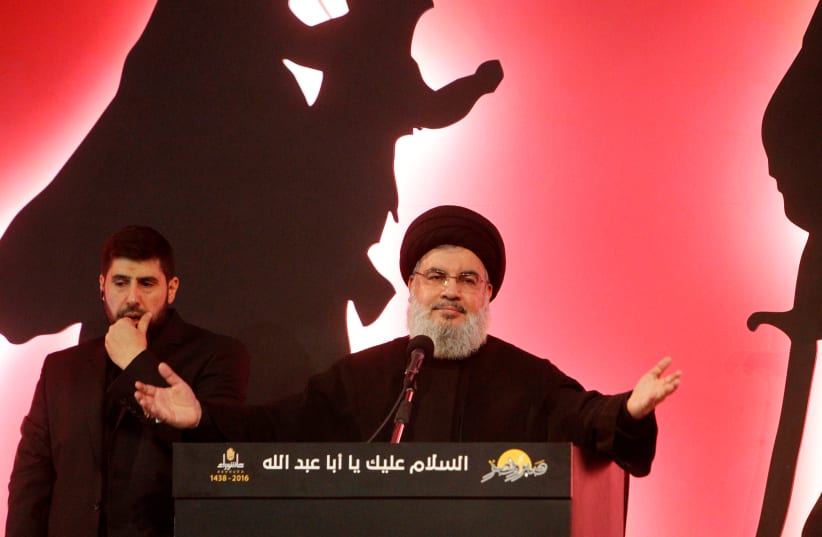“Due to developments and situational assessments, it was decided three months ago that the precision missile project would be given high priority because of the immediate danger it poses. The military echelons were informed of this decision,” the senior official said, adding that “we cannot afford to be surrounded by thousands of precision missiles that could land and harm the State of Israel.”“Our three targets have one address: Iran,” the source continued, adding that Iran’s Quds Force Commander Qassem Soleimani is the address for two of the three threats. He refused to answer how Israel could deal with him.“To prevent this consolidation by Iran, we are carrying out many operations that nobody knows anything about,” he said, adding that the operations are carried out by the IDF and the Mossad.“Everything we have done during the last few weeks and days was planned and executed exactly how we wanted,” he said. “Everything is part of our overall strategy that we are managing in several different ways and in several different arenas.”According to the senior official, Israel had planned and prepared for possible enemy reactions.On Monday night, Hezbollah leader Hassan Nasrallah called the attack on Avivim a success which was “deliberately” carried out during the day.“Israel, the tyrant and arrogant, claiming to possess the region’s strongest army, was seen by the world scared and worried for eight days,” he said during a speech.Hezbollah, he said, broke “the biggest redline for dozens of years” for Israel by targeting it across the border, not in the contested Shebaa Farms area where the group had previously targeted IDF troops.The attack against Avivim was a message to Israel, Nasrallah warned.“We no longer have redlines. This is the start of a new phase. Remember this date.”The senior official spoke as a tense quiet returned to northern Israel after Hezbollah fired three Kornet anti-tank missiles at empty IDF vehicles near the community of Avivim along the Lebanese border on Sunday.According to the official, Lebanese Prime Minister Sa’ad Hariri passed a message to Israel via Egypt, France and the United States from Nasrallah to stop the fire.Israel, he said, replied that “quiet will be answered with quiet.”The IDF’s Northern Command has been on high alert since last week, expecting a limited strike against military targets over strikes in Syria and an alleged Israeli drone attack in Beirut’s Dahiyeh last week.While Israel has remained quiet and not claimed carrying out the attack in Beirut, Nasrallah said the Israeli attack “was a failure.”On Sunday, IDF Chief of Staff Lt.-Gen. Aviv Kochavi met with UNIFIL Force Commander and Head of Mission Maj. Gen. Stefano Del Col, who called the attack against the IDF a “serious incident in violation of UN Security Council resolution 1701 and clearly directed at undermining stability in the area.”Kochavi, who was meeting Del Col for the first time since he assumed his position in January, told the UNIFIL commander that Israel “will not accept harm to our citizens or our soldiers, and we will not accept Hezbollah’s precision missile project on Lebanese soil.”According to Kochavi, “the current state of affairs is not one we can accept” and called on Lebanon and UNIFIL to stop Iran and Hezbollah’s precision missile project.“The State of Lebanon and UNIFIL must bring an end to Iran and Hezbollah’s precision missile project in Lebanon and fully implement [UN] Security Council Resolution 1701,” he said.Lebanon will suffer the consequences if it does not rein in Hezbollah, Foreign Minister Israel Katz told his German counterpart Heiko Mass in a phone conversation on Monday.Katz, according to a statement put out by his office, said that Israel has no interest in seeing an escalation of the situation in the North, but is prepared for all scenarios and will “react with strength against any attack against it, and will view the State of Lebanon as responsible.”Katz thanked Germany for passing messages on to the Lebanese government. He also called on Germany to impose sanctions on Hezbollah and – as Britain has done – to place it on its terrorist blacklist. Mass, according to the statement, said that Berlin views Hezbollah in Lebanon in a similar way as Jerusalem, and that it will consider declaring it a terrorist organization.Herb Keinon and Jerusalem Post Staff contributed to this report.#BREAKING #Hezbollah-linked Al-Manar TV is broadcasting now the video of yesterday’s ATGM attack against an IDF armored vehicle in northern Israel pic.twitter.com/Kct9hqjwsY
— Yosef Yisrael (@yosefyisrael25) September 2, 2019
Top defense official: In 24 hours, Israel attacked various 'fronts'
Official says stopping Hezbollah missiles top priority for Israel after Iran nukes. ‘Had we not acted correctly we would be in a different reality today'
